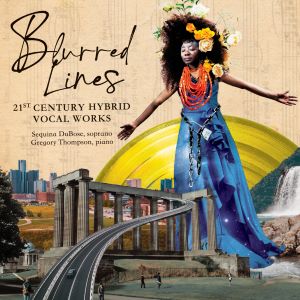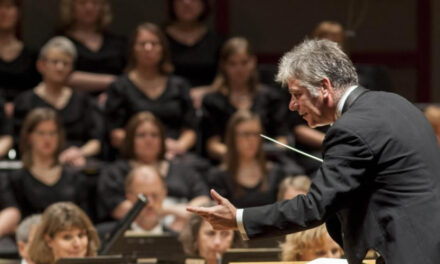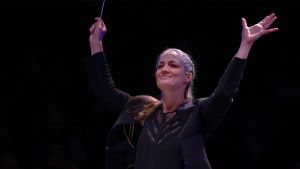Sequina DuBose, soprano with Gregory Thompson, piano. With Mira Frisch (cello); Daniel Ferreira (percussion); Robert Linton (bass guitar); Kari Giles (violin); Jessica Lindsey (clarinet) and David Hughey (tenor). Contents: “Oh, Yemanja” from Scourge of Hyacinths (Tania León); “If I Had Known” (B.E. Boykin); “The Aftermath” (Maria Thompson Corley); “A Jelly-Fish” (Leonard Mark Lewis); ” Notes from a Town Hall Meeting” (Peter Hilliard); ” Inside is What Remains” (Nkeiru Okoye); from Queen “I Dream” and “Love to Give” (Douglas Tappin); from DIVA “The Glory” (Douglas Tappin). Total Time: 46:28. Recorded April 29 – May 2, 2022, at Sharon Road Presbyterian Church, Charlotte, North Carolina. Produced, engineered and edited by Soundpost Productions. Mastered by Studio B Mastering. Cover image: Ajani Winston. Released by: Albany Records TROY1909 - PRICE: $16.99; Also available on Apple Music.
Blurred Lines: 21st Century Hybrid Vocal Works, featuring soprano Sequina DuBose collaborating with pianist Gregory Thompson, is an enticing and timely recording. It features several 21st-century composers on the scene today, mostly women and/or people of color. The CD is decidedly eclectic, and as the excellent liner notes by DuBose make clear, the composers “blur the lines between opera, classical art song, and other musical genres.” She also states that the “music is as apropos in major concert halls and on the mainstage, as it is in nontraditional spaces.”
The opening piece is an aria, “Oh Yemanja” from Scourge of Hyacinths by Tania León (Cuba, b. 1943); it is based on true events that took place in Nigeria in the early 1980s. It is a prayer to the goddess Yemanja (a “water deity”) to help her son “escape military persecution by taking a water-route to safety.”
The chordal piano intro invites the listener into gently rippling, quasi-repetitive figures, certainly conjuring up water. The angular cello line (powerfully and lovingly presented by Mira Frisch) introduces the singer and “represents Yemanja. . . conversing with the mother.”
DuBose’s delivery is impressive and powerful, befitting a mother pleading for her son’s safety. The gentle piano accompaniment is masterfully played by Thompson. The cello is the icing on the cake.
In “I Had Known” by B.E. Boykin (US, b. ca 1990) sets the poetry of Alice Ruth Moore Dunbar-Nelson (US, 1875-1935). This, too, is a dramatic number, with “a repeated soulful rhythm and blues bass line motif that underscores a lyrical melody interrupted by abrupt rests, reflective of the speaker’s hesitant emotional state.” DuBose’s delivery makes the most out of several tone-painted lyrics.
The Aftermath, a song cycle by Maria Thompson Corley (Jamaica, b. 1966), was commissioned for this recording. The composer states “The text for my cycle The Aftermath was written before I had any idea what life would be like, post-pandemic.”
The first of the three pieces from The Aftermath, “Angst,” begins with a solo wail from Dubose before the piano joins in. According to the composer ” ‘Angst’ acknowledges the anxiety we all dealt with.” Indeed, “Angst” is a lament of all the things we all gave up during the isolation forced on us by Covid. The song becomes a bit frenzied, with some wild piano accompaniment and spoken/shouted text.
” ‘Divergence’ suggests that returning to ‘normal’ is too low a bar” and features some “advanced” piano techniques like strumming the strings, but also has some straight-ahead “normal” tonal moments, creating a colorful and effective tapestry. Upbeat “Ricochet” “comments on humanity’s ability to bounce back.” The song features a nice walking bassline in the left hand accompanying a blues-infused right hand on the piano; a nice scat from the singer finishes the delightfully quirky song.
A poem by Marianne Moore (US, 1887-1972), “A Jelly-Fish,” was set by Leonard Mark Lewis (US. n.d.) for this recording. According to the composer, the song “merges the language of post-minimalism with Bessie Smith’s lyricism and the voicings of Bill Evans.” A mildly dissonant piano intro leads into the warm and expressive singing of DuBose. The accompaniment continues some of the patterns presented in the intro, with “cool” jazz chords.
The mood of the CD lightens with Notes from a Town Hall Meeting, music by Peter Hilliard (US, n.d.) with lyrics by Matt Boresi (US, b. 1975). According to DuBose, the two “combine comedic numbers with serious ones to offer commentary on social justice and narrate the strained interpersonal relations brought on by stressful times,” while the music “rides a line between jazz and art song.”
The opening “Infrastructure Complaint” is a humorous description about an injury. “Progress on Initiatives Following Tragedy” sarcastically presents school “safety.” The jazzy “Regarding the Suspicious Proliferation of Computer Repair Stores” examines a shady business. The more serious “Response to Injuries During Protest” points out the dangers to individuals caught up in public protests. The concluding “Neighbor Dispute” is a saucy number that describes a “justified response” to an irritating neighbor.
DuBose and Thompson are joined by Daniel Ferreira (percussion), Mira Frisch (cello), Kari Giles (violin), Jessica Lindsey (clarinet) and Robert Linton (bass guitar). These short, pithy songs expand the concept of what chamber music is with elements of jazz and blues.
“Inside is What Remains” with lyrics and music by Nkeiru Okoye (US, b. 1972), was commissioned by Tulsa Opera for the Tulsa Race Massacre Centennial Memorial Concert, “Greenwood Overcomes.” This quasi-anthem, strongly proclaiming that “Kindness is the key,” provides a brilliant display piece for the soprano.
The last three selections on the CD are written by Douglas Tappin (UK, b. 1967). Two are from the “musical drama” I Dream, which is about Dr. Martin Luther King, Jr. The song “Queen,” beautifully presented by DuBose, is a lovely, soulful ballad sung by Martin’s wife Coretta. It explains her isolation, which is nicely captured in the line “Queen, where is your King now?” ”Love to Give” is a duet between DuBose as Coretta, and Martin, fervently sung by tenor David Hughey. The poignant number describes the couple’s first meeting as Coretta explains her love for Martin; the song ends with both singing together “I have love to give.” Both numbers feature the strong support from Thompson, bass guitarist Linton, and percussionist Ferreira.
Tappin’s “The Glory” from DIVA has a musical theater feel to it, as an aging Diva considers the end of her career. This is a powerful song, stirringly presented by DuBose about the adulation one gets as a performer who recognizes that her career is over. She questions “The glory . . . is it there?” It is a fitting ending (DuBose calls it a “show-stopper”) to a wonderful album that explores the current “classical” vocal music scene.













